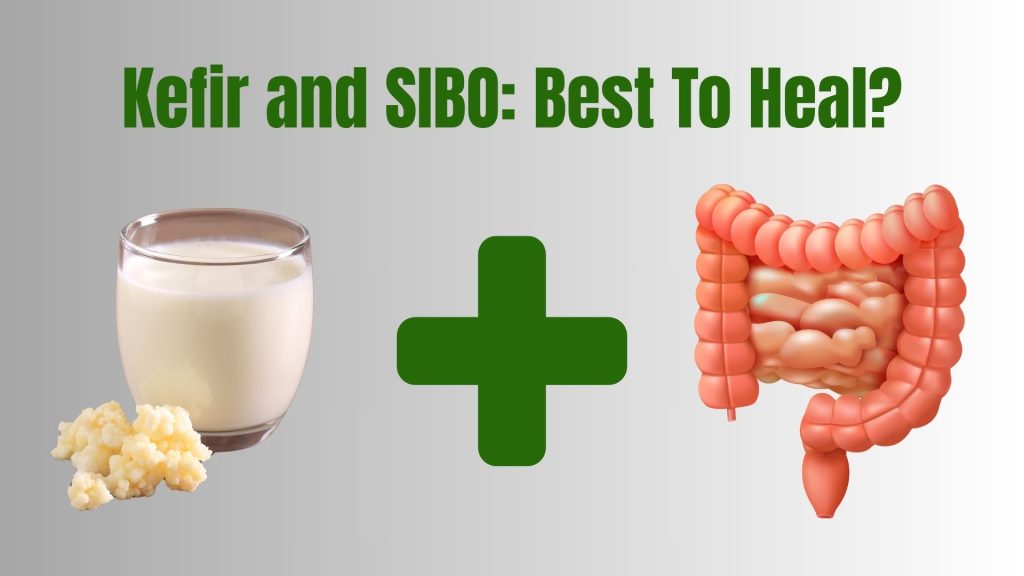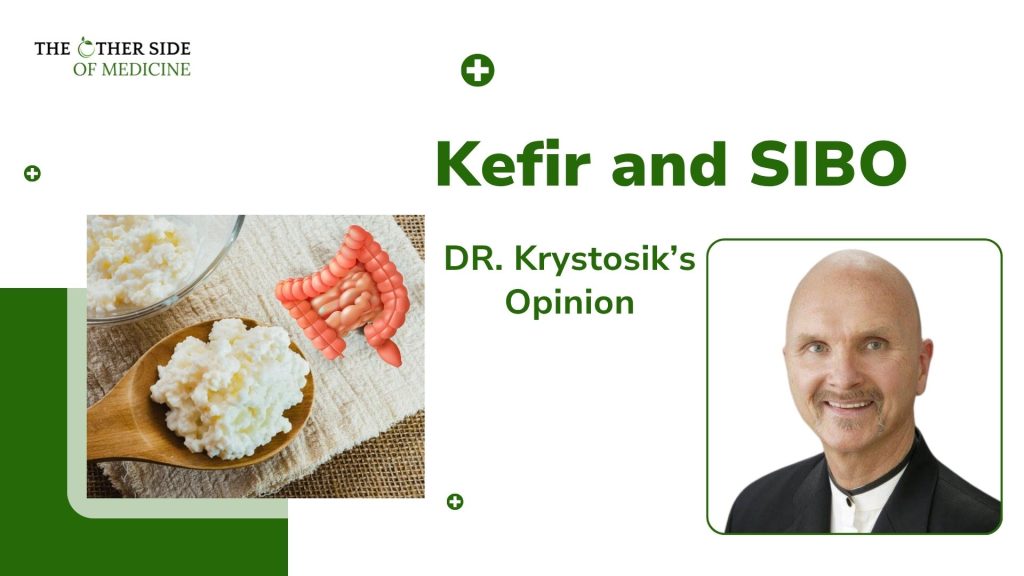Small Intestinal Bacterial Overgrowth, or SIBO, is a hidden epidemic wreaking havoc on the guts—and lives—of millions. Symptoms like bloating, gas, cramping, and indigestion are brushed off by conventional medicine or masked with medications, while the root cause remains unaddressed. But what if a traditional, fermented drink—kefir—could play a role in both healing and harming, depending on how and when it’s used?
In this article, we’ll explore the complicated relationship between kefir and SIBO, evaluating the risks, benefits, timing, and the functional medicine perspective. If you’re wondering, “Is kefir good for gut health?” or “Can kefir cause bloating?”, read on. This might just be your roadmap to gut healing with kefir.
What Is the Relation Between Kefir and SIBO?

Let’s start with the basics. Kefir is a fermented drink made from milk (or my professional choice, plant-based alternatives) using kefir grains, a symbiotic culture of bacteria and yeast. Rich in probiotics, kefir introduces beneficial bacteria to the small intestine, potentially helping rebalance the microbiome.
But here’s the dilemma—SIBO is an overgrowth of bacteria in the small intestine. That’s right, even good bacteria in the wrong place can be problematic. In early or active stages of SIBO, loading the gut with fermented foods and probiotics to soon—yes, even kefir—may backfire, causing bloating, gas, or worse.
So, while fermented foods and SIBO may seem like allies, the relationship is complex, and timing is everything.
Benefits of Kefir for SIBO
When introduced at the right time, kefir can be a powerful ally in reintroducing probiotics with SIBO. Here’s why:
- Restores Gut Flora: Kefir is a natural source of beneficial bacteria for the small intestine, including Lactobacillus and Bifidobacteria—key players in a healthy microbiome.
- Heals the Gut Lining: Rich in nutrients like biotin, calcium, and vitamin K2, kefir supports mucosal healing and combats leaky gut, a common consequence of prolonged SIBO.
- Boosts Immune Function: About 70% of your immune system lives in your gut. Kefir supports immune health through microbial diversity and anti-inflammatory compounds.
- Dairy-Free Options Available: Millions of people, especially those suffering from SIBO, experience dairy food allergy or sensitivity. Luckily, dairy-free kefir for SIBO made from coconut water or almond milk offers the same benefits without the allergenic baggage.
- Improves Motility: Some bacterial strains in kefir aid in improving migrating motor complex (MMC) activity, which helps keep bacteria out of the small intestine where they don’t belong.
Risks of Kefir with Active SIBO
While kefir offers numerous benefits, introducing it too early can cause problems:
- Start Slow and Low: Try introducing kefir into your diet slowly and in small quantities, 1 TBS. at each meal. If there is any increase in symptoms, STOP until further notice. If, you don’t experience increased levels of gas or bloating, continue with 1 TBS. of kefir into your diet per meal for one week. After one week, if you don’t experience any increase in symptoms, increase to 2 TBS. of kefir per meal for another week. If there is any increase in symptoms, STOP until further notice. If you don’t experience an increase in gas or bloating, continue to add an additional tablespoon of kefir per week.
- Fermentation Fuel: Kefir contains simple sugars and fermentation byproducts that may feed bacterial overgrowth, worsening symptoms. Proceed with caution when considering adding kefir to your diet.
In functional medicine, we often say, “The right tool at the wrong time is the wrong tool.” That certainly applies here.
When to Use Kefir in SIBO Treatment
Timing is critical. During the initial phase of the SIBO elimination diet, kefir and other fermented foods should be introduced slowly and cautiously. The first priority is to reduce bacterial load through antimicrobials or targeted antibiotics, dietary changes, and lifestyle support.
When Is Kefir Helpful For SIBO?

There will be some situations when Kefir will be best for SIBO. These situations are discussed here.
- Pre-Eradication Phase: As mentioned above, proceed slowly and cautiously when adding kefir into your SIBO diet before the bacterial overgrowth is resolved.
- Post-Eradication Phase: Once the bacterial overgrowth is resolved, kefir can help repopulate the gut with SIBO-friendly fermented foods normally without reservation.
- As Part of a Rebuilding Strategy, following antimicrobial therapy, rebalancing the microbiome is essential to prevent recurrence. Kefir may be part of a broader plan involving the best probiotics for SIBO recovery.
- Used with Caution and Gradual Introduction: Even after microbial eradication. Start small—1 to 2 tablespoons per day—and monitor symptoms closely.
Functional Medicine Perspective
Conventional medicine often misses the mark by treating SIBO as an isolated infection. But functional medicine, the model I’ve used to help thousands of patients, sees SIBO as a symptom of upstream dysfunction: poor motility, low stomach acid, food sensitivities, and yes, dysbiosis.
Kefir doesn’t fix SIBO on its own, but it plays a valuable role in restoring balance in the gut microbiome. In my practice, we pair it with:
- Targeted gut-healing nutrients (like aloe vera, zinc carnosine, and herbs like slippery elm bark)
- Personalized diet to reduce inflammation, strengthen the immune system, and heal the leaky gut.
- Strategic timing of probiotic use with SIBO
- Comprehensive lifestyle upgrades—because you can’t out-supplement a toxic lifestyle
Our goal isn’t just symptom relief. It’s gut restoration.
Conclusion
So, is kefir a friend or foe in SIBO recovery? The answer lies in context. During active infection, kefir should be introduced slowly and cautiously. But once the terrain is cleared and healing begins, kefir can almost always be introduced without reservation to help restore the internal ecosystem, one sip at a time.
To maximize benefits and minimize risks:
- Choose dairy-free kefir for SIBO to avoid further complications from cow’s milk allergies or sensitivities.
- Reintroduce slowly during the pre- and post-eradication phase.
- Always work with a provider trained in functional medicine who can tailor your strategy for healing.
Remember, probiotics and SIBO aren’t mutually exclusive—they just need proper timing and personalization. And while fermented foods can support healing, they are most effective when paired with a holistic strategy that addresses diet, lifestyle, and root causes.
If you’re on the journey to fix kefir and digestive issues, don’t go it alone. Your gut is too important—and your healing too precious—to leave to chance. The right guidance makes all the difference.
Goodbye Illness. Hello Wellness.

